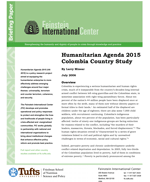The experience of Colombia sheds light on all four themes of the HA 2015 research. First, with respect to universality, Colombia sees itself as part and parcel of the western world. There is broad resonance between Colombian religious and civil traditions and the global humanitarian ethos, laws, and institutions. This comfortable fit exists despite the general unwillingness of key Colombian political authorities to acknowledge the presence of internal armed conflict, which would be to accept the applicability of international humanitarian law. In a larger sense, however, the authorities do not question the framework of international norms by which Colombian policies and practices are judged.
The focus group and individual interviews conducted for this study concentrated on terrorism, understood as “violence or the threat of violence against ordinary civilians, against their life, their property, their well-being. Terrorism is a means to attain a political goal which allegedly could not be attained by ordinary, lawful means, within the context of the established constitutional order.” A broadly held consensus emerged that what might be called “small ‘t’ terrorism” was tearing apart the human, social, economic, and political fabric of Colombian society while introducing major complications into the functioning of international and domestic humanitarian and human rights organizations. At the same time, alleged connections to an overarching global war on terrorism (“capital ‘T’ terrorism”) were found to be overdrawn. Although there are myriad interactions between Colombia and Latin America, the United States, and the wider world, terrorism does not provide the central axis for them. While the Colombian authorities, who see their nation involved in a life-and-death struggle for survival, perceive advantages in framing local challenges by reference to the global war, these benefits are, in broader compass, significantly outweighed by the damages to the humanitarian enterprise resulting from the inclusion of Colombia within the “global war on terrorism” framework. To many of those interviewed in Colombia, the government’s preoccupation with terrorism seems diversionary to the task of overcoming long-standing economic and social inequalities.
Although lack of effective state presence is an underlying factor in the conflict, Colombia prides itself on being a well established democracy, with an elected president, vice president, and legislature, a system of checks and balances, and a rich and complex array of institutional viewpoints and power centers. Yet anomalies abound. The contextualization by the Uribe and Bush administrations of the conflict within a global war on terrorism distorts a clear understanding of what is transpiring and skews policy responses. Humanitarian and human rights groups are forbidden from having contact with the armed non-state actors, though they encounter them routinely at roadblocks and elsewhere in their daily rounds. Capital “T” terrorism is, in short, less an objective reality than a name people give to violence that makes them uncomfortable.
As for the third theme, coherence, the prevailing political framework promoted by the United States government in the form of Plan Colombia and embraced by the Colombian authorities in its own “democratic security” policy provides an uneasy fit for international assistance and protection activities and a point of tension between the US and other donors. While a UN political or peacekeeping framework might arguably have provided a more comfortable home for such international activities, UN organizations themselves evidence considerable difficulty in functioning as a system and in advancing a common strategy in response to challenges such as preserving humanitarian access to contested areas and relating to the demobilization and reintegration of the paramilitaries. With humanitarian and human rights activities placed within the prevailing political framework and portrayed as extensions of it, the resulting politicization has minimized the contribution of such activities to the construction of peace.
Finally, with regard to security, there has been by most accounts an overall reduction in the incidence of specific forms of violence in late 2005 and early 2006 from the withering levels of the preceding five years. Yet a climate of fear still pervades many sectors of society and there were, at the time of the research visit, still numerous incidents taking place, including killings and harassment of leaders of civil society organizations. The impacts of continuing instability on humanitarian organizations included reduced profile and outreach and, in some areas, suspension of programs altogether. As of March 2006, eight of thirty-two Colombia’s provinces had been closed to humanitarian operations for reasons of security. “It is still dangerous to talk about human rights in this country,” observed one respected commentator. Chilling indignities and daily insecurities of many of Colombia’s rural and displaced poor stood in sharp contrast with more upbeat appraisals by the Colombian and US authorities.







